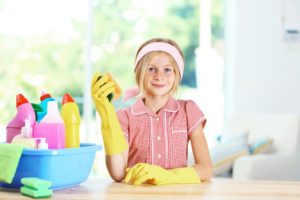 Children may not think that having a clean and tidy home is as important as you do. But with a few skills (and some patience) you can help them to create good housekeeping habits that will serve them well into their adult years. Here are some ideas for helping your kids to understand the importance of keeping the house (and their rooms) clean and organized. Make organizing fun. Blast some tunes and dance around while you pick up the house. Let kids know that cleaning and organizing doesn’t have to be drudgery. It can be something that’s fun to do together as a family.
Children may not think that having a clean and tidy home is as important as you do. But with a few skills (and some patience) you can help them to create good housekeeping habits that will serve them well into their adult years. Here are some ideas for helping your kids to understand the importance of keeping the house (and their rooms) clean and organized. Make organizing fun. Blast some tunes and dance around while you pick up the house. Let kids know that cleaning and organizing doesn’t have to be drudgery. It can be something that’s fun to do together as a family.
Involve your kids in the cleaning process. Each child gets a special job. Reward good behaviour, too. One great way to do this is by hanging a chore chart on your refrigerator. Each day that the child’s room remains clean and organized, the child earns a checkmark. After a certain number of check marks have been earned, you may want to plan a family reward – going ut for ice cream or a trip to the swimming pool, for example. Keep the daily tasks small. Help kids to understand that if they stay on top of the daily chores (making beds, vacuuming, sweeping, laundry, and general tidiness), they don’t have to take a lot of time. A lot of kids like having a checklist to run through, too, when they are doing their daily or weekly clean up time.
 Get organized. Make sure your kids’ rooms are set up to facilitate tidiness. Can your kids easily reach their closet rods? If not, it will be harder for them to hang up their clothes. Do they know the proper way to fold a shirt? Make sure you start your child off right with properly labeled bins, and, if they have too much stuff in their room, move some of the things they don’t play with as often into the playroom or family room. The same goes for the rest of your house: When everything has a “home,” from the car keys to the remote control, everyone in the house spends less time looking for things.
Get organized. Make sure your kids’ rooms are set up to facilitate tidiness. Can your kids easily reach their closet rods? If not, it will be harder for them to hang up their clothes. Do they know the proper way to fold a shirt? Make sure you start your child off right with properly labeled bins, and, if they have too much stuff in their room, move some of the things they don’t play with as often into the playroom or family room. The same goes for the rest of your house: When everything has a “home,” from the car keys to the remote control, everyone in the house spends less time looking for things.
Make sure kids understand the virtues of tidiness, which can include better time management, fewer broken toys, and less frustration. Plus, when our living spaces are neat and tidy, we tend to naturally feel more comfortable and less stressed. Whenever we have finished tidying our home, I like to always comment to my kids how nice and relaxed it makes me feel. Typically, they will agree, even if helping me to tidy up the place wasn’t on their short list of priorities.
Be a good role model, and reinforce good habits. Make sure that your children know that when they make a mess, they need to clean it up, every time. When everyone in the house follows these same rules, they will, over time, become hardwired into the kids’ brains. And it helps a lot when they see parents cleaning a mess as soon as they’ve made it, too. Make sure you do the dinner dishes before you leave the kitchen for the evening and pick up your towel and straighten the bathroom after taking a shower.
Make sure you aren’t expecting too much, based on your children’s ages and stages. Very young children will often follow the example of the other children and adults when it comes to putting away their toys. A regular routine can help, and so can special “clean up” songs. Still, you’ll need to have lots of patience with toddlers and preschoolers, and older kids as well. They have lots of growing to do before they keep a spotless room. Understand that kids of all ages will have a different threshold for the kind of cleanliness that they will keep up. Let kids be kids, with certain guidelines, and know that their needs, abilities, and priorities in this area will expand and contract as they age.